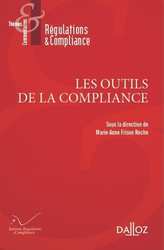📝Résoudre la contradiction entre "sanction" et "incitation" sous le feu du Droit de la Compliance, in 🕴️M.-A. Frison-Roche (ed.), 📕Les outils de la Compliance
pour lire cette présentation en français ↗️cliquer sur le drapeau français

► Full Reference: M.-A. Frison-Roche, "Résoudre la contradiction entre "sanction" et "incitation" sous le feu du Droit de la Compliance" ("Resolving the contradiction between "sanction" and "incentive" under the fire of Compliance Law"), in M.-A. Frison-Roche (ed.), Les outils de la Compliance, coll. "Régulations & Compliance", Journal of Regulation & Compliance (JoRC) and Dalloz, 2021, p. 89-98
____
📝read the article (in French)
____
🚧read the bilingual Working Paper which is the basis of this article, with more developments, technical references and hyperlinks
____
📕read a general presentation of the book, Les outils de la Compliance, in which this article is published
____
► Summary of the article (done by the Journal of Regulation and Compliance): Compliance and Incentives appear at first glance to be totally opposite. For two major reasons. Firstly, because sanctions have a central place in Compliance Law and that the incentives suppose an absence of constraint on the operators. Secondly, because the incentives are linked to self-regulation and that Compliance Law assumes a strong presence of public authorities. Thus, one should choose: either Compliance or Incentives! Either the effectiveness of one or the effectiveness of the others; either the techniques of one, or the techniques of others; either the philosophy of one or the philosophy of the other. Resign oneself to the waste that such a necessary choice would imply. But to put the terms in this way amounts to thinking poorly about the situations and reducing the fields of the solutions they call for. If we take a rich definition of Compliance Law, we can on the contrary articulate Compliance and Incentives. From this perspective, sanctions can no longer become what blocks the use of incentives but, on the contrary, what constitutes them. Even more, the coupling between the Incentives and the requirements of Compliance Law must be strongly encouraged, as soon as the public authorities supervise in Ex Ante all the initiatives taken by the "crucial operators".
This article deals with the first issue. Indeed, the so-called incentive theory targets mechanisms which do not directly resort to constraint. They would therefore have little place in Compliance Law. But it seems saturated with sanction procedures. We can even say that it seems to put them at the center, the public authorities presenting the number of sanctions as a sign of success, while the companies seem obsessed with their prospects, the two concerns ending in such a strange convergence that are the Convention Judiciaire d'Intérêt Public (non-prosecution agreement).
The honest observer cannot help but be immediately uneasy. Indeed, it can only raise the definition of the sanction as a "constraint" triggered Ex Post, at the very heart of a Compliance Law which is presented as a set of Ex Ante mechanisms. Based on this contradiction in terms, should we give up the association and think that it would be wrong against the spirit to think of the sanction as an incentive?
It is undoubtedly in this connection that one perceives most clearly the clash of two cultures, which do not communicate, while technically they apply to the same situations. Indeed, because Compliance was designed by Finance, everything is a tool for it. Therefore, the tendency to think of the sanction only as an incentive is very strong in Compliance Law, manifests itself continuously and will not stop (I). But whatever the reasons for conceiving it this way, the principles of the rule of law cannot disappear and if we do not want them to be erased, then they must be articulated (II). This is an essential game (II).
This is why we can literally say that Compliance has set Criminal Law on fire by its conception, logical but closed in on itself, of sanctions as simple incentives. In order for Law to remain, however, we must hold a very firm definition of Compliance Law centered on its Monumental Goal, which is the protection of the person.
________
comments are disabled for this article